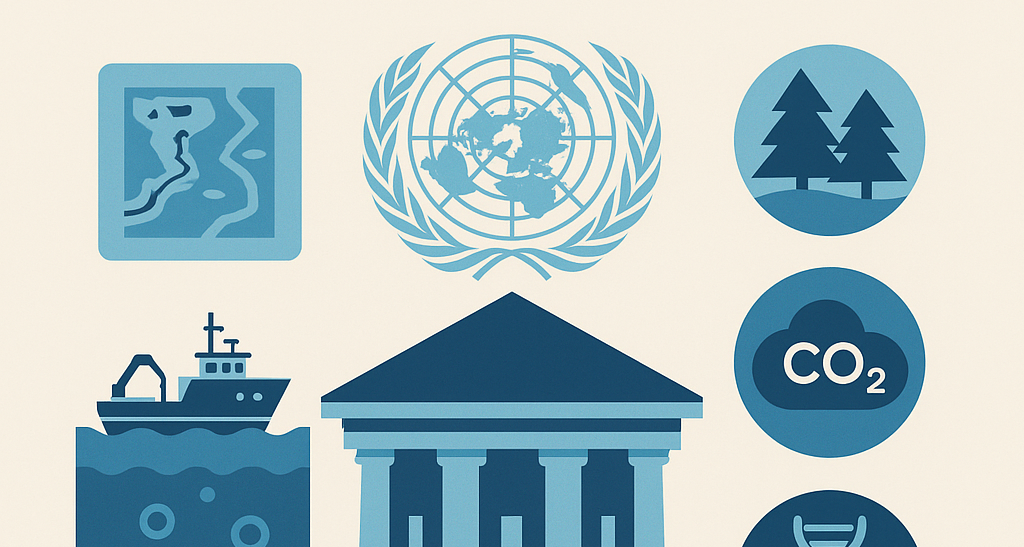The International Seabed Authority Problem
The International Seabed Authority is at centre of one of the most important battles of the 21st century - the race for minerals at the bottom of the sea. Will it green light deep sea mining or scupper long-held commercial dreams?

Since writing, Donald Trump has signed the deep sea mining executive order discussed in this piece.
It's the regulator you’ve never heard of and yet it controls more than half the planet.
The International Seabed Authority, or ISA, has been quietly doing its job for 30 years but an explosive race for minerals is changing that.
Like its headquarters, Jamaica, the International Seabed Authority has a laid back vibe.
But this body controls more than half the planet - 54 percent to be exact - and it's about to decide its fate in what's being dubbed the gold rush of the 21st century.
It's the battle to access minerals at the bottom of the sea and big money miners and the countries that sponsor them are nipping at its heels. They've invested time and tech into extracting the manganese, nickel, cobalt and copper sitting in vast swathes of rocks called polymetallic nodules on the ocean floor, but until the ISA gives the go ahead, it's all just a dream.
A potentially lucrative dream. Because would be miners say all those minerals are needed for the production of electric vehicles, renewable technologies, electronics, and a host of modern infrastructure that's about to define the 21st century.
The minerals are plentiful on the bed of the high seas, governed by this UN body established in 1994 to regulate what's known as the Area - a vast expanse of international waters that is outside any one country's jurisdiction and is governed by the UN Convention on the Law of the Sea (UNCLOS).
Why is the ISA embattled?
Well, they're under pressure to green light deep sea mining to access those minerals, even though environmentalists, oceanographers, and over 30 countries including powerful ones like Germany and France are urging them to chill.
We don't know enough, hesitant scientists caution.
But one mining company is tired of waiting. The Metals Company, based in Canada and trading on the Nasdaq, is aggressively pushing the ISA to finish the regulations that would govern deep sea mining so they can start extracting value for shareholders.
We've put in the research, tested the tech, and will protect the environment, their Donald Trump courting CEO insists.
But it doesn't help that their sponsoring country is Nauru.
Every commercial deep sea miner applying to the ISA for a licence in the "Area" needs a country sponsor that's party to UNCLOS and therefore one of the 170 members of the ISA. Some of those must be developing countries, according to UNCLOS, and commercial miners have been courting smaller nation states to support their endeavours.
Countries like Singapore, Jamaica and Nauru have already signed sponsorship agreements.
But, with its long infamous history of being exploited by terrestrial extractors from the UK and Australia, Nauru is an environmental cautionary tale. Ravaged by phosphate extraction that devastated its land and economy because promises of replenishment were never met by extractors, this Micronesian state off the coast of Australia has signed up to back even more mining. This time, off shore, and through The Metals Company, helmed by bombastic Aussie, Gerard Barron, who has promised a better, more symbiotic approach this time - a partnership that will benefit Nauru. Naturally, there's skepticism.
Triggering the stop clock
But all in, Nauru has taken centre stage. As home to a subsidiary of The Metals Company called Nauru Ocean Resources Inc, or NORI, the small Pacific state of 14,000 inhabitants did something extraordinary in 2021 to force the regulator’s hand. It put the ISA on official notice of the intent to mine.
Under rules drawn up in 1994, the ISA has to approve regulations within two years of receiving a notice to mine or the notifier's application must be considered under existing terms. That means TMC could begin to mine using its licence to do so in the Clarion Clipperton Zone, without proper oversight, if the ISA doesn’t complete those regulations.
Yet the Authority didn't meet the two year deadline in 2023. Its members couldn't agree on key elements. And four years later, Nauru and The Metals Company are getting even more agitated.
Sunshine showdown
Now, as the ISA prepares to meet in July 2025 for its 30th meeting and second one this year, it's under pressure to finish the regulations surrounding Deep Sea Mining and let the commercial players dive in. Or er, use their remotely operated vehicles.
The ISA has already issued 22 exploration contracts (19 in the coveted Clarion-Clipperton Zone) to these contractors and their sponsoring countries who are required to ensure their commercial partners stick to the regulations. How they'll do it and by what means are what the regulator needs to flesh out when it convenes another round of meetings on the Kingston Waterfront.
But it won't be smooth sailing. Because the list of countries calling for a moratorium on deep sea mining has grown past 30. And they're heading to Kingston to stop the madness along with oceanographers, environmentalists, and diplomats.
An American sized twist
It's going to be tense. But something else could throw a spanner in the works and give the new Secretary General - oceanographer Leticia Carvalho - an even bigger headache. Donald Trump's presidential pen.
The United States is not a party to UNCLOS or the ISA, and it's itching to write its own rule book on deep sea mining at a time of intense battle against China for the raw materials that will power the 21st century. China has sponsored more exploration contracts through the ISA than any other nation state, with growing disquiet in the US legislature about that. Some US lawmakers are urging Donald Trump to sign an executive order to assert his country’s rights to conduct deep sea mining in international waters. Others say he should lead the US to ratify UNCLOS and join the conversation in Kingston, arguing that the super power's observer only status has been exploited by both Russia and China.
It’s no wonder then that The Metals Company CEO just paid a visit to Washington.
While we wait for the new sunshine showdown on the Kingston Waterfront in July, let's talk about the Americans.
An editorial note:
Since the time of writing, Donald Trump has signed the executive order discussed. Please see our next piece - The Trump Intervention - for details on the development or go to our homepage for the latest.
For editorial comments or questions: [email protected]

